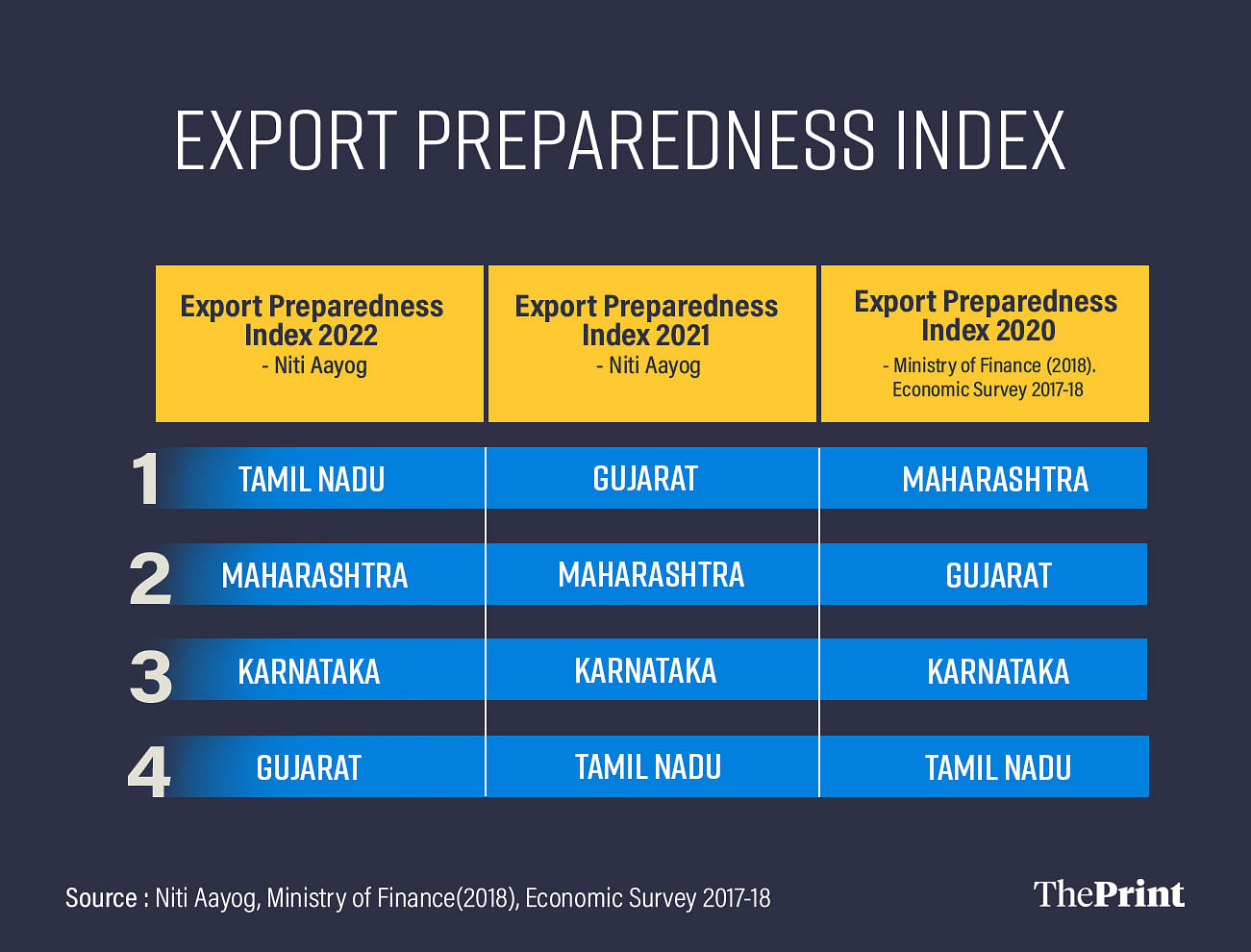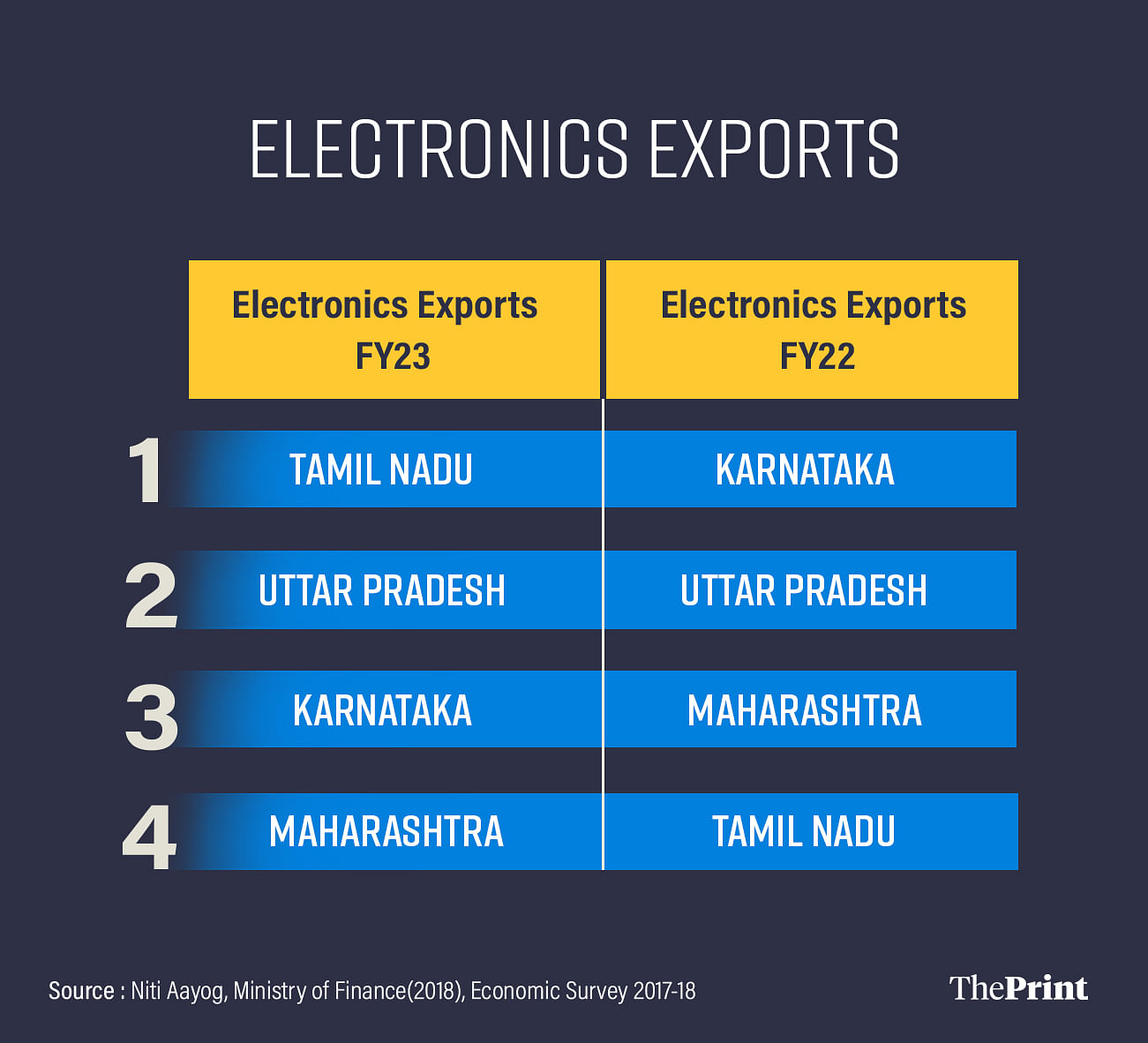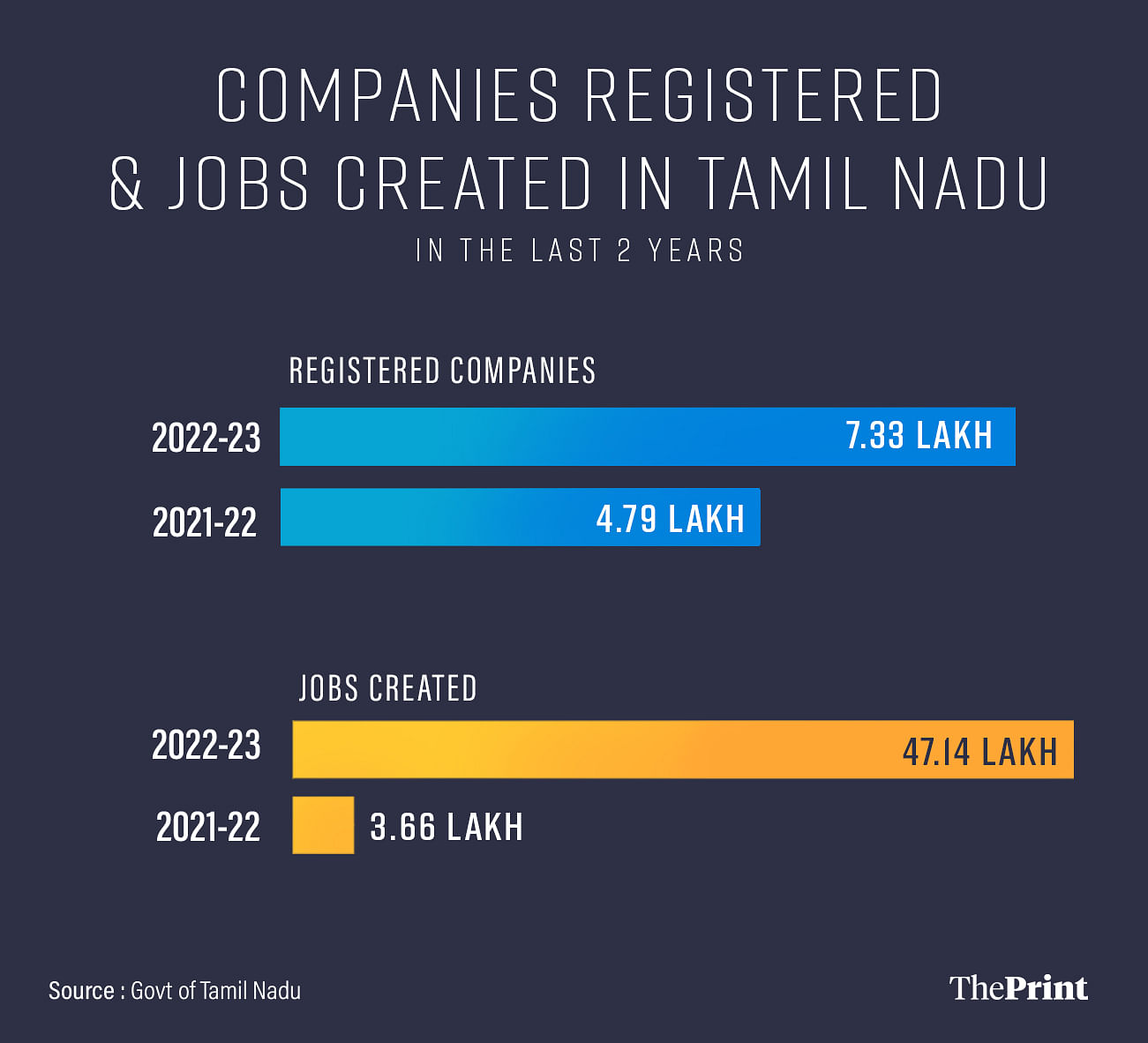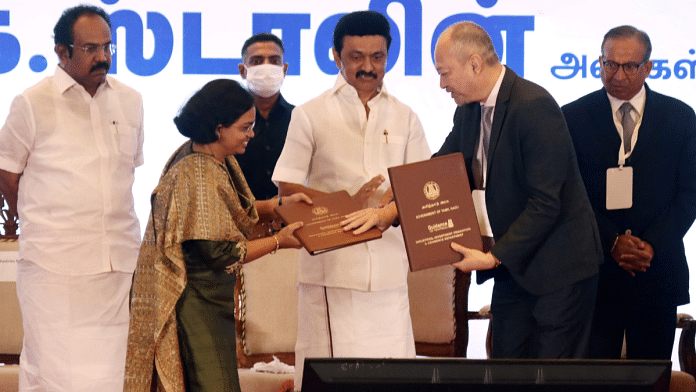Chennai: Stable governance and politics, sector-specific policy interventions and prompt action. This is what officials and experts claim has helped Tamil Nadu thrive as a major investment destination in India.
July saw the state top the third edition of the Modi government think-tank NITI Aayog’s Export Preparedness Index (EPI) for 2022. The index measures the export performance and potential of the Indian states and Union territories and factors in, among other things, the direct and indirect aspects that support it.
Tamil Nadu’s performance in 2022 was an improvement from the year before, when it was placed fourth on the list. The same year, the state had been ranked third in the implementation of the central government’s Business Reform Action Plan 2020, a list of 301 reform points covering 15 business regulatory areas. This was a significant leap from the 14th position it had secured in 2019.

Tamil Nadu also became the top exporter of electronics in 2022-2023, according to the central government’s National Import-Export Record for Yearly Analysis of Trade (NIRYAT) data — it now accounts for 22.8 per cent of India’s electronic exports, with figures nearly tripling to $5.37 billion from $1.86 billion the year before, according to media reports.

For Tamil Nadu’s Dravida Munnetra Kazhagam (DMK) government, which swept to power in 2021, this comes as a massive shot in the arm — although the state has always been counted among India’s most industrialised, this is the first time it has topped the EPI charts since NITI Aayog began releasing its assessment report in 2020.
Officials and experts ThePrint spoke to said policy interventions have helped the state emerge as a destination for investments — both domestic and foreign.
According to M. Suresh Babu, a professor of economics at the Indian Institute of Technology Madras, Tamil Nadu doesn’t have a single overarching policy to help push its industries. Instead, it tailors sector-specific policies by identifying “sunrise sectors” — businesses or sectors with the potential for rapid growth, Babu said.
“For example, immediately after Covid-19 in 2021, there was an effort to increase the production of medical devices. Similarly the state has, in a big way, focused on the Electric Vehicle (EV) industry. The state already has advantages in this sector as it has a strong automobile industry. Now they are further enabling a transition to EV by a very specific set of policies,” he said.
T.R.B Rajaa, the state’s minister for industries, investment promotion and commerce, attributes the state’s success to “several corrective measures” and the Dravidian Model — a governance model that, according to the DMK, involves inclusive planning and democratic governance for ease in approachability, policymaking, and action.
According to industries minister Rajaa, the state government’s policy interventions have helped bring investments to the state.
“In 2022 alone, this government released the Aerospace and Defence Industrial Policy, Footwear and Leather Products Policy, Life Sciences Promotion Policy, and Research & Development Policy. In 2023, we have released a new EV policy and a logistics policy (for transporting goods and services). These new policies and other smaller policy tweaks, along with streamlining processes in industry-focused departments, has led to good results,” Rajaa told ThePrint.
Also Read: ‘Made more money…’ — after Annamalai’s ‘expose’, BJP attacks DMK over purported leaked audio of PTR
TN success mantra — ‘policy interventions, addressing concerns’
The most recent fillip to the state’s policies was Taiwanese electronics multinational Foxconn’s signing of an agreement to invest Rs 1,600 crore for a mobile components manufacturing facility in the state’s Kancheepuram district. Best known for manufacturing Apple’s iPhones, the company’s new facility will reportedly be distinct from its existing facility near Chennai and is expected to generate 6,000 new jobs.

The development comes amid the DMK government’s aggressive push to attract global industrial businesses to the state, according to officials from the state’s industries department.
Officials also cite the state government’s accessibility and quick response for its success.
According to S. Krishnan, Tamil Nadu’s additional chief secretary of industries, investment promotion and commerce, his department’s goal has been to ensure that the companies that set their base in Tamil Nadu are comfortable. This means supporting industries through their life cycle.
“The existing investors have to do well in order for the state to do well industrially. They are our best ambassadors for attracting other investors into the state,” said Krishnan. “We ensure their issues are addressed (and) whatever promises in terms of incentives and government grants, clearances etc are made are done with the least difficulty.”
Industries minister Rajaa relates an instance of one such intervention. At a roundtable on 16 July this year, representatives of some EV companies suggested tweaks in the state transport department’s licensing policy for registering EVs.
“We immediately brought this to the attention of the CM. Within 12 days, just 12 days, the policy was changed and a GO (government order) was passed,” Rajaa said.
According to R. Ganapathi, a national executive member of the Federation of Indian Chambers of Commerce & Industry (FICCI), companies want two things — for their concerns, both present and future, to be heard and for them to be addressed.
“(The) M.K. Stalin government seems to have really hit the road running very well with these two things,” he told ThePrint, adding that the state’s “educated young force, law and order control and infrastructure” are assets that have helped its performance.
Guidance Bureau and Biz Buddy
Along with policy interventions, officials and industry experts credit the DMK government’s restructuring of a nodal government agency, Guidance, to help improve ease of doing business in the state.
Established in 1992, Guidance is an agency that, according to its website, is mandated under the Tamil Nadu Business Facilitation Rules to help promote and encourage investment in the state through round-the-clock support.
According to government officials, the agency, which had only eight officers until three years ago, now has a team of 60.
“The recent boost to the industry’s department and the jump in ranking for ease of doing business and making Tamil Nadu a preferred destination has been a direct reflection of Guidance’s work,” Managing Director and Chief Executive Officer Vishnu Venugopal told ThePrint.
It was through this that M. Ponnuswami, chairman and managing director of chemical company Pon Pure Chemicals Pvt Limited secured a no-objection certificate (NOC) for a project that had been stuck for three years.
Ponnuswami, also Confederation of Indian Industry’s (CII) South region chairman for ease of doing business and MSME committee, told ThePrint that he registered a complaint with Biz Buddy, a round-the-clock helpdesk for the industry introduced two years ago, on the Guidance website. “The very next day I got a call from a representative stating that they will come down the following day for inspection. In another 30 days’ time, the whole process was completed,” he said.
Since it was introduced, Biz Buddy has had 325 grievance redressal calls, of which it has resolved 308, its website shows.
According to additional chief secretary of industries Krishnan, most minor issues get resolved in two to three weeks. “The complicated cases, or legal issues, take more time but we ensure a constructive solution to those as well,” he said, adding that his department had “a very process driven system”.
Also Read: Can a governor dismiss a minister? Tamil Nadu row revives debate on discretionary powers
Consistency from state govt
But it isn’t just the ruling DMK government’s policies that are responsible for the state’s success — according to experts like Suresh, part of the reason for the state’s investment growth is relative stability in politics and governance.
Suresh told ThePrint the state’s policies remain consistent regardless of which of the two major Dravidian parties — the incumbent M.K. Stalin-led DMK or the rival All India Anna Dravida Munnetra Kazhagam (AIADMK) — is in power.
A serving senior IAS officer who didn’t want to be named, agrees. “In 1995, Ford and Hyundai first started talking to the AIADMK-led Tamil Nadu government but even after the government changed in 1996 and DMK came to power, the projects continued and whatever was promised was delivered,” the officer told ThePrint, adding that support for the state’s industries has been consistent from both the ruling governments.
Since it came to power, the state’s DMK government has been trying to project the state as an investment destination. CM Stalin has undertaken two official foreign visits — a four-day trip to Dubai in March 2022 and a nine-day trip to Japan and Singapore — in an attempt to woo investors.
The opposition, however, has accused Stalin and his family of corruption to the tune of Rs 30,000 crore and has called the CM’s foreign visits “the DMK first family’s personal trips” to park their “ill-gotten gains”. The DMK has dismissed the claims.
“The AIADMK, under the leadership of (former CM) J. Jayalalithaa was the first to conduct a global investors meet in the state, and (former CM) Edappadi Palaniswami carried forward this tradition. AIADMK has had a good track record and that is why investors kept coming to Tamil Nadu,” former party MP J. Jayavardhan told ThePrint.
In response, DMK’s Rajaa called the previous AIADMK government under Palaniswami “incompetent”, adding that “they made a mockery of the state in front of the industry”.
Tamil Nadu, he claimed, was already seeing the impact of the visits and is confident of moving new projects from agreement stage to production in 9-12 months.
“Under the leadership of CM MK Stalin, we are confident that 80-85 per cent of the MoUs we sign will get grounded in a time-bound manner,” he said.
The road ahead
According to experts, national rankings are subject to change and, therefore, it’s not uncommon to see industralised states such as Gujarat, Maharashtra or Karnataka moving up and down the list. What matters, according to them, is converting a promise into investment.
“Tamil Nadu’s USP has been that they have been able to convert the promises into actual investment,” IIT professor Suresh Babu, quoted earlier, said. “Additionally, they have been able to improve their infrastructure. They were once global players in textiles, but now they have managed to expand into other sectors as well. This is something that other states are still striving to achieve.”
According to Rajaa, the state is now focusing on EVs and green energy.
“EV is definitely a major sector for us and with the state’s electronics manufacturing output increasing, it will naturally pave the way for us becoming the EV capital of the world,” said Rajaa.
Another key sector is aerospace and defence — an industry that builds aircraft, ships, spacecraft, weapon systems, and defence equipment. Last year, Stalin unveiled its Aerospace and Defence Industrial Policy, 2022, with an aim to attract investment up to Rs 75,000 crore.
Besides these, the state also hopes to be a major hub for fintech and medtech, the industries minister said.
The state government has earmarked Rs 100 crore in its 2023-24 budget for a Global Investors Meet (GIM) that it will organise in Chennai in January next year. It has also allocated Rs 410 crore for new industrial parks in Virudhunagar, Vellore, Kallakurichi, and Coimbatore.
The industry, meanwhile, wants the government to focus on creating more Special Economic Zones (SEZs) and SIPCOT industrial complexes. While SEZs are zones with special business and commercial laws aimed at encouraging investments, SIPCOT, or the State Industries Promotion Corporation of Tamil Nadu Ltd, is an entity of the state government that is tasked with setting up industrial parks in the state.
“There are many private players who are interested to enter Tamil Nadu and they are hoping that the state will bring in more SEZs and SIPCOT-like set up,” CII’s Ponnuswami told ThePrint.
(Edited by Uttara Ramaswamy)
Also Read: ‘Not a yes man’ — why Stalin ‘values’ Tamil Nadu finance minister PTR, target of BJP’s audio files



